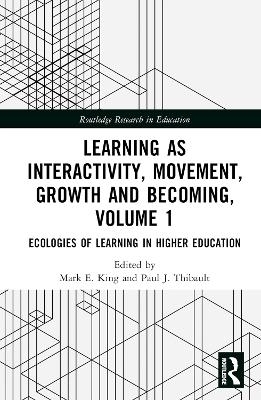
Learning as Interactivity, Movement, Growth and Becoming, Volume 1
Routledge (Verlag)
978-0-367-70796-5 (ISBN)
The two inter-linked volumes in this series are dedicated to the development of analysis and theorisation of learning and teaching in higher education. The two volumes focus on the multi-scalar ecological inter-connectedness of learners with teachers, with artefacts, with cultural patterns and resources, with places, with social activities and practices, with social institutions, with time and temporality, and with technologies. Learning reflects inter-individual dynamics that are shaped by biology and culture.
Against prevailing orthodoxies that view learning in higher education in terms of "information transmission" and "content delivery," the contributors articulate leading developments in distributed cognition, distributed language, ecological psychology, enactivist and embodied-embedded cognitive science, interactivity, and multimodal event analysis. They also extend several earlier traditions such as American pragmatism, embodied curriculum theory, and Vygotsky's latter day anti-dualist Spinozan turn.
Through detailed empirical analysis of in vivo episodes of learning using multimodal event analysis, cognitive event analysis, and cutting-edge theory, the authors show how and why learning is not adequately explainable as internal mental processes per se. Instead, sophisticated empirical analysis and innovative theory are put to work to reveal the emergence of learning in the interactivity of learners and teachers with the affordances of a distributed brain-body-environment learning system.
Volume 1 is an edited collection of seven chapters written by internationally renowned researchers together with an Introduction and an Afterword written by King and Thibault. Volume 1 (and its successor Volume 2) will serve as valuable reading for educationalists and researchers in the cognitive, communication, learning, and language sciences who are looking for new multidimensional tools for thinking about, and new empirical tools for analysing, learning, and teaching as multi-scalar interactive processes in radical embodied ecologies of learning and teaching.
Mark E. King is Professor of Higher Education at RMIT University and Academic Director, Singapore. Paul J. Thibault is Professor in Linguistics and Communication studies at University of Agder, Norway.
Introduction: Radical Embodied Educational Ecologies for Learners and Teachers. 1. Coming to Conceive: Radical Embodied Thinking in Action. 2. Insights through Interactivity: Learning as Interactivity in the Ecological Niche of Supervision in Higher Education. 3. Translanguaging and Trans-semiotizing in a Public Relations Writing Course: Exploring Heteroglossic Co-Becoming in a Higher Education Institute in Hong Kong. 4. Emotion, Play, and Learning: Gaming After School. 5. On Developing the Later Vygotsky’s Monist Views into a Transactional Psychology. 6. A Cognitive Event Analysis of Learning Emergence in Naturalistic Medical Environments: The Role of Interactivity and Embodiments. 7. Interactivity, Learning and Creativity: From interaction to Co-action in Higher education.
| Erscheinungsdatum | 01.08.2023 |
|---|---|
| Reihe/Serie | Routledge Research in Education |
| Zusatzinfo | 2 Tables, black and white; 10 Line drawings, black and white; 21 Halftones, black and white; 31 Illustrations, black and white |
| Verlagsort | London |
| Sprache | englisch |
| Maße | 156 x 234 mm |
| Gewicht | 689 g |
| Themenwelt | Geisteswissenschaften ► Sprach- / Literaturwissenschaft ► Anglistik / Amerikanistik |
| Geisteswissenschaften ► Sprach- / Literaturwissenschaft ► Literaturwissenschaft | |
| Geisteswissenschaften ► Sprach- / Literaturwissenschaft ► Sprachwissenschaft | |
| Sozialwissenschaften ► Pädagogik ► Allgemeines / Lexika | |
| Sozialwissenschaften ► Pädagogik ► Bildungstheorie | |
| Sozialwissenschaften ► Pädagogik ► Erwachsenenbildung | |
| ISBN-10 | 0-367-70796-9 / 0367707969 |
| ISBN-13 | 978-0-367-70796-5 / 9780367707965 |
| Zustand | Neuware |
| Informationen gemäß Produktsicherheitsverordnung (GPSR) | |
| Haben Sie eine Frage zum Produkt? |
aus dem Bereich


